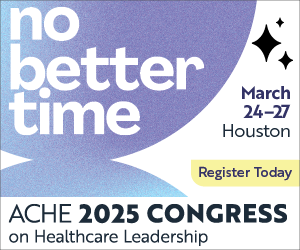
- Financial Challenges, Workforce Challenges Cited as Top Issues Confronting Hospitals
- Innovating Behavioral Health in the ED
- Monthly Membership Perk:
Leading With Purpose: Strategic Goal Setting in Healthcare - Reaching for Board Certification in Healthcare Management
- Helping Communities Achieve the Best Outcomes
Financial Challenges, Workforce Challenges Cited as Top Issues Confronting Hospitals
Financial challenges and workforce challenges top the list of hospital CEOs’ concerns, according to the American College of Healthcare Executives’ annual survey of top issues confronting hospitals.
For the first time in the survey’s history, financial challenges and workforce challenges tied as respondents’ top concerns. Both received an average rank of 2.8 on an 11-point scale. Access to care ranked third with an average rank of 5.2.
Sent in October 2024 to community hospital CEOs who are ACHE members, the survey asked respondents to rank 11 issues affecting their hospitals in order of how pressing they are and to identify specific concerns within each issue. The survey was sent to 1,297 community hospital CEOs, of whom 257, or 20%, responded.
Innovating Behavioral Health in the ED
Patients visiting the ED with co-occurring behavioral health conditions and who require transferring to a behavioral health facility are often impeded for a variety of reasons. John Muir Health believes it developed a solution.
Hospital operations, medical staff and nursing leaders at the San Francisco area health system saw an opportunity for innovation in patient flow from the ED to the acute psychiatric hospital by establishing the Centralized Patient Transfer Center that integrated physical and psychiatric medicine.
This whole-person care model streamlined patient throughput and improved access, care coordination and timeliness to lifesaving treatment. The optimization of clinical resources improved hospital operations and elevated the standard of patient care, helping to reduce behavioral health stigma and disparities.
You can learn more about John Muir Health's success at the Congress on Healthcare Leadership in Houston. Presenters Jesse Tamplen, FACHE, executive administrator, Behavioral Health, and vice president, Continuous Performance Improvement, John Muir Health, along with Kristen Pace, RN, director of nursing, Acute Psychiatric Hospital, John Muir Behavioral Health, will present “Whole-Person Care Integration” on Wednesday, March 26, To find out more about this session and others or to register, visit the ACHE Congress website.
Monthly Membership Perk:
Leading With Purpose: Strategic Goal Setting in Healthcare
Led by ACHE faculty—including professors from the DePaul University Driehaus College of Business and the Ohio State University College of Public Health— “Leading With Purpose: Strategic Goal Setting in Healthcare” delves into evidence-based techniques for overcoming resistance and fostering sustainable behavioral change within teams. This session equips attendees with science-backed methods for creating sustainable change and leading teams through an increasingly complex healthcare environment.
Learn to set and achieve goals with strategies rooted in the latest insights from psychology and behavioral sciences, designed specifically for healthcare leaders. In viewing this webinar, you can analyze key principles from the psychology of change and behavioral sciences to enhance goal setting and attainment in healthcare settings.
The regular rate for members of this webinar is $49 from the On-Demand Recorded Library, but as this month’s Membership Perk, the recording is complimentary through March 10 and worth 1 Qualifying Education credit. Take advantage of this benefit by entering the discount code “FEBPERK2025” when registering for this webinar. For other topics of interest, visit the ACHE on-demand digital learning library.
We hope you enjoy this Monthly Membership Perk, and we thank you for being a part of the ACHE community.
Reaching for Board Certification in Healthcare Management
Becoming board certified in healthcare management as an ACHE Fellow bestows recognition among healthcare executives that you demonstrate competency in all areas of healthcare management and are committed to change and improvement.
Here’s what colleagues who have attained the FACHE credential have to say. Andrew S. Mullins, FACHE, CEO, Lifeline of Ohio, Columbus, asserts, “Find out what you need to do now to be able to become a Fellow. You'll never regret it.”
Angela R. DeLaere, FACHE, president/CEO, Visiting Nurse Association and Blue Water Hospice, Port Huron, Mich., echoes that sentiment. “Fellow status has helped me in my career,” she says. DeLaere doesn’t believe that she would be at this point in her career without this important healthcare credential.
Learn more about earning the credential by participating in a complimentary FACHE overview webinar set for March 13. Participants will get a complete overview of the process, including eligibility requirements, materials needed for the application process and information about how to prepare for the Board of Governors Exam. The webinar is free, but registration is required.
Helping Communities Achieve the Best Outcomes
Amid the challenges of an aging population, Medicare solvency and health disparities, it’s time to move toward an approach to care that prioritizes quality, outcomes and affordability for all populations, according to Mark Angelo, MD, FACP.
Author of the book Caring for Our Communities: A Blueprint for Better Outcomes in Population Health, Angelo, CMO, Population Health, University of Pennsylvania Health System, Philadelphia, draws on his expertise as a as a senior administrator of a large accountable care organization and a leader in population health and palliative medicine. He provides guidance for developing effective population health programs and answers questions about value-based care models, using real-world examples and industry experts’ views.
Improving care will require examining technology, breaking down divisions between payers and providers, and creating partnerships along the entire care continuum. Angelo says that “to succeed, we must create and support collaborative systems that make the right thing to do, the easy thing to do in our healthcare system”—even when the change does not come easily.
Angelo will speak, along with Joel Port, FACHE, at the Congress on Healthcare Leadership, Tuesday, March 25 in Houston. Their session, “15 Years After the Affordable Care Act: What’s Worked and Not Worked in Value-Based Care,” will address the challenge of making value-based care more meaningful and successful in the future.




